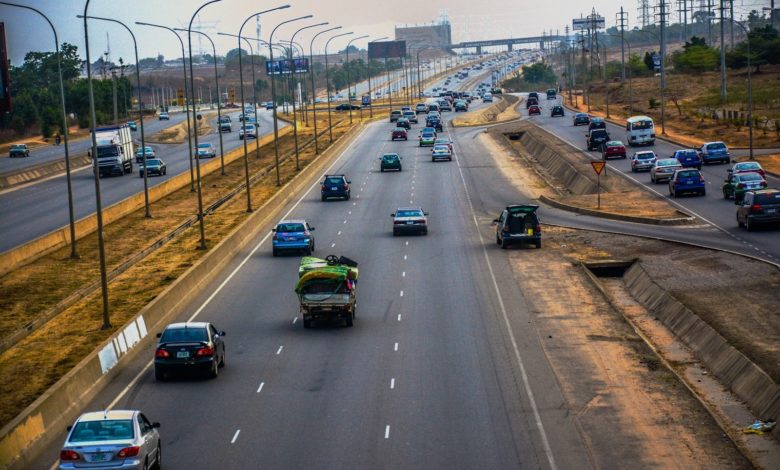Abuja-Akure: 41 Security Checkpoints But No Guarantee Of Safety
For a lot of Nigerians, travelling around the country triggers nightmares, as there are fears of kidnappings, robberies, and killings. When this HumAngle reporter took a trip from Abuja in North-central Nigeria to Akure in the Southwest, he counted 41 policed checkpoints that held the security of the highways by a thread.

In recent times, when one is embarking on a trip in Nigeria, there are several factors to consider. With the growing insecurity in the country, there is a widespread fear of kidnappings and robberies.
The safety of Nigerian highways has become a matter of utmost concern for road commuters, particularly in the wake of incessant security breaches and incidents befalling travellers across many highways in the country. Against this background, on my recent trip from Abuja in North-central Nigeria to Akure, the capital of Ondo state in the Southwest region, I was most conscious of making the trip and returning unscathed.
I boarded a vehicle that took the Lokoja-Kabba highway, boycotting the Okene axis, because of the better road condition. There are five highways along the route;Lokoja-Abuja expressway, Lokoja-Kabba expressway, Akoko-Kabba expressway, Akoko-Owo expressway and Owo-Akure expressway.
During my trip, between March 4 and March 6, I counted 41 security checkpoints between Abuja and Akure. There were seven security contacts between Giri junction in Abuja to Felele junction in Lokoja, alone.
Three of these security checkpoints were manned by officers of the Nigerian army – at Abaji, Murtala Muhammed Bridge, and Koton Kafe, Banda, very close to Felele Junction, Lokoja. The other four were officers of the Nigeria police force, Joint Task Forces (JTFs) and officers of Nigeria Security and Civil Defence Corps (NSCDC).
It is not surprising to come across checkpoints at continuous intervals between Lokoja, Kabba and Akoko expressway. These highways have a history of being notorious pitch points for armed robbers and kidnappers. Reports of attacks on security personnel were even more rampant mid-2020.
There were about 25 security points moving through Zango, Lokoja annex, Obajana-Lokoja express road, Oshokosho, Alape town, Odo-Ape, Kabba-bunnu, Ijumu, Akunu-Akoko, Auga Akoko, Okeagbe-Akoko, Ayere-Akoko, Ikare-Akoko, Akungba-Akoko and Akungba-Owo expressway.
The security check points consist of different units of forces including the Police, Counter Terorism Squad, The Nigerian Army, NSCDC, and Kogi State vigilantes among others.
The presence of security personnel on the Owo-Akure expressway was similar to the breaks at Lokoja, Kabba and Akoko expressway. For every 5-10 minutes drive from Owo to Akure, there was a security presence keeping watch on the road.
General attitudes of security personnel on the highway
The popular narrative of extortion by security personnel from drivers and road commuters was still very existent on the highways I used on this trip. Almost all the checkpoints, except for a few within the Lokoja-Kabba expressway were openly showing hands in expectation of bribes from drivers.
Only a few security personnel at checkpoints did any serious checks on passengers after stopping vehicles, before passing them on.
However, for every checkpoint manned by personnel of the Nigerian Army and JTFs, vehicles were not just passed on. They took notes of the passengers in the vehicles, asked the drivers some questions, especially regarding where they were driving from and heading to.
Growing fears
Many Nigerians are now very skeptical of road travels for safety concerns. Some highways are now deemed riskier depending on the level of reported kidnappings, robbery attacks, and killings. The general perception of the Abuja-Kaduna expressway, Okene- Lokoja and Kabba expressway, is that they are some of the most dangerous routes to ply by road.
Those who cannot afford to travel by air, are still left with the risky fate of unsafe highways. Moreso, the railway system is yet to go round the country.
The Kaduna-Abuja highway, for instance, has, in recent times, witnessed a ton of kidnappings and armed robbery.
In May 2018, over 120 people were kidnapped along the Birnin- Kaduna road, Africa News reported. In November 2020, it was reported that the Bursar of the Rufus Giwa Polytechnic Owo in Ondo state, Mr Adejuwon Mathew, narrowly escaped being kidnapped by criminal herdsmen, using their cattles to block the road.
In an interview with HumAngle, Folashade Adeyemi, a graduate of Mass Communications, Adekunle Ajasin University, Akungba Akoko, said “the sight of security personnel on the road when traveling gives her a signal of safety. Everytime I spot police officers or security personnel on the highway when travelling, I feel safe and think the road to be free of armed robbers and kidnappers especially with the trends of insecurity on our highways.”
“This does not mean there haven’t been reported cases of kidnapping on highways patrolled by the police, however, it is better to have the Police on the road than leave the whole highway to the hands of criminals,” Adeyemi said.
I returned to Abuja safely, but I couldn’t stop thinking about the long term implications of having several security agencies on the highways without the guarantee of safety. It seemed ironic that we have so many security outfits on the roads and yet, no one is exactly safe from kidnappings, robberies and killings.
Support Our Journalism
There are millions of ordinary people affected by conflict in Africa whose stories are missing in the mainstream media. HumAngle is determined to tell those challenging and under-reported stories, hoping that the people impacted by these conflicts will find the safety and security they deserve.
To ensure that we continue to provide public service coverage, we have a small favour to ask you. We want you to be part of our journalistic endeavour by contributing a token to us.
Your donation will further promote a robust, free, and independent media.
Donate HereStay Closer To The Stories That Matter




